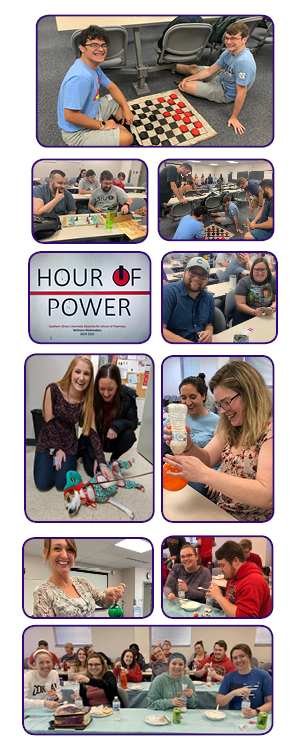Official Newsjournal of the Illinois Council of Health-System Pharmacists
Southern Illinois University Edwardsville School of Pharmacy
Taking A Break With The Hour Of Power
College Connection
by Justin Shiau, P2, President-Elect SIUe School of Pharmacy
 The profession of pharmacy offers unforgettable experiences of patient interactions that are incorporated with drug effectiveness and safety. It is a dynamic field that includes careers in industry, education, retail, clinical, and much more. The road of pharmacy, however, is rigorous and stressful. Once out in the work field, the everyday rounds and possible negative interactions may place huge burdens on the pharmacist, leading to increased mental issues and burnout. Recently, there has been increasing numbers of people developing mental health issues nationwide, especially young adults.1 As a result, some college campuses have reported having a difficult time keeping up with providing resources for students.2
The profession of pharmacy offers unforgettable experiences of patient interactions that are incorporated with drug effectiveness and safety. It is a dynamic field that includes careers in industry, education, retail, clinical, and much more. The road of pharmacy, however, is rigorous and stressful. Once out in the work field, the everyday rounds and possible negative interactions may place huge burdens on the pharmacist, leading to increased mental issues and burnout. Recently, there has been increasing numbers of people developing mental health issues nationwide, especially young adults.1 As a result, some college campuses have reported having a difficult time keeping up with providing resources for students.2A: “Psychiatric medications are an integral aspect of treatment for many psychiatric conditions, however medications are often just one part of an overall wellness plan. For mental health conditions such as schizophrenia and bipolar disorder, medications are often considered first-line and necessary for symptom reduction and improved quality of life. For health conditions such as depression and anxiety, antidepressants and anxiolytics are certainly valuable, but practicing overall wellness is also incredibly valuable. This may include the integration of psychotherapy, mindfulness-based interventions, and proper nutrition and exercise. Psychiatric medications should always be prescribed in a thoughtful manor, weighing risk (adverse effects, drug interactions) with benefits (improved mood and sleep, reduced psychosis and anxiety). I am also an advocate of the shared decision-making model, an approach that encourages a collaborative treatment plan that supports the patient as an active participant in their care.”
- American Psychological Association. Mental health issues increased significantly in young adults over last decade: shift may be due in part to rise of digital media, study suggests. Available at: www.sciencedaily.com/releases/2019/03/190315110908. Accessed 15 March 2019.
- Carapezza, Kirk. As demand for mental health services rises, colleges scramble to provide resources to students. Available at: https://www.wgbh.org/news/education/2019. Accessed 21 November 2019.
Contents
Columns
Small & Rural Hospitals Network
ICHP Leadership Spotlight Interviews
ICHP Leadership Spotlight Interviews
Features
2020 Member Greeting/7 Ways to get MORE out of your ICHP membership in 2020
College Connection
Midwestern University Chicago College of Pharmacy
Roosevelt University College of Pharmacy
Rosalind Franklin University College of Pharmacy
Southern Illinois University Edwardsville School of Pharmacy
University of Illinois at Chicago College of Pharmacy
More
Regularly Scheduled Network Meetings
Chicago Area Pharmacy Directors Network Dinner
3rd Thursday of Odd Months
5:30pm
Regularly Scheduled Division and Committee Calls
Executive Committee
Second Tuesday of each month at 7:00 p.m.
Educational Affairs
Third Tuesday of each month at 11:00 a.m.
Government Affairs
Third Monday of each month at 5:00 p.m.
Marketing Affairs
Third Tuesday of each month at 8:00 a.m.
Organizational Affairs
Fourth Thursday of each month at 12:00 p.m.
Professional Affairs
Fourth Thursday of each month at 2:00 p.m.
New Practitioner Network
Second Thursday of each month at 5:30 p.m.
Technology Committee
Second Friday of each month at 8:00 a.m.
Chicago Area Pharmacy Directors Network Dinner
Bi-monthly in odd numbered months with dates to be determined. Invitation only.
